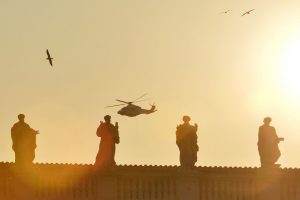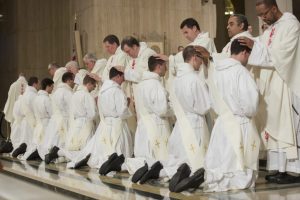Among the vast contributions of Joseph Ratzinger/ Pope Benedict in his rich writings and catecheses, it seems to me that his other greatest contribution is an orientation towards freedom.
Freedom of liturgical expression
Immediately after Vatican II, a certain rigidity arose in regards to liturgical expression. With few exceptions besides the Eastern Churches and the Carthusian Order, variety in liturgical expression vanished.
I once spoke with a Norbertine priest who left his order during that time to become a secular priest. He spoke fondly of the Christmas Sequence and other aspects of the Premonstratensian Rite, which were effectively suppressed. Without this liturgical expression, he did not feel the need to stay in the order.
In my experience, dismissal of liturgical expression is rarely accomplished by argument, but by belittling and even sarcasm. This can be true on all sides. Pope Benedict allowed, explained, fostered, and in the case of the revolutionary liturgical generosity of the Ordinariates, invented brand new kinds of ecumenism out of whole cloth.
Freedom from positivism
In the post-scientific age, biblical criticism and philosophy were narrowed into very weak, positivistic sciences. While the renaissance of a robust philosophy has yet to be seen outside of certain key centers, biblical studies have already turned the corner. In the Catholic world, one of the early leaders of this recovery is the Communio school, of which Joseph Ratzinger was a founder.
If truth is symphonic, as his close colleague von Balthasar wrote, then the “science” of theology does not need to be astringently limited to what is strictly demonstrable on the most skeptical grounds. We can synthesize as well as analyze. We can draw from thinkers who wrote well before the 19th century and take them seriously.
His nuanced approach is beautifully laid out in his preface to his first volume of his Jesus of Nazareth trilogy.
Freedom for “simple faith”
Without in the least despising learning, Pope Benedict always had a heart for the “simple believer,” and believed that as a bishop fostering simple faith was his role. See for example his Communio article “The Church and Scientific Theology.”
I’ve known theology professors who truly subscribed to a scorched earth policy regarding the faith of childhood. In order to come to an adult faith, they held, childhood faith must be eradicated, and all the more so if one is to be a theologian. One hears less of this kind of thing in modern homilies than before, but perhaps it is still current in some theology faculties. “Theology is not catechetics” was one formulation I have often heard, as if these were two separate projects rather than one integrated whole.
Besides the grave danger of the enterprise–who is to say that the shards of faith will be united again?–there is an unreasonable hermeneutic of rupture here. The faith of children is the foundation for adult faith, not its opposite. I believe this continuity was displayed in his own life, even in public.
In listening to Pope Benedict’s homilies over the years, two expressions have impressed me as said with particular emphasis. One, during Christmas, is “Bambino.” The other, during Easter, is the Pauline expression “newness of life.” Both of these point to a unified faith, a fully mature Christian theologian who is unembarrassed to be a simple, receptive believer.




